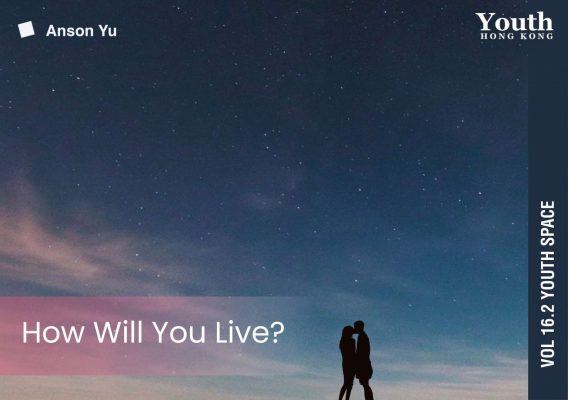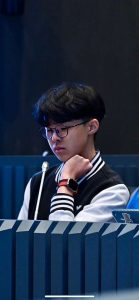//16.2 Youth Space: Books
How Will You Live?
by Anson Yu
The book 「How Do You Live?」 delves into the complexities of friendship, family, and personal growth, leaving Anson pondering his teenage life and what type of person he wants to become.
On my 15th birthday, I made a more mature choice than before. Instead of getting a video game, I bought myself a book as a gift, hoping to challenge my mind and nurture my soul. As I wandered through the cosy aisles of a bookstore, fate guided me to a book that posed a profound question: How Do You Live? As I sit here writing, I am transported back to that chilly evening when I discovered this captivating novel. The scene that resonated with me the most was when the protagonist, Copper, found comfort in reconciling with his friends. I can’t help but imagine experiencing such a heartwarming reunion one day.
Authored by Genzaburo Yoshino, this novel reveals the complexities of friendship, family, and personal growth. Within its pages, a quote in particular struck a chord within me. It goes, 「The things that you feel most deeply, from the very bottom of your heart, will never deceive you in the slightest.」
The narrative unfolds in a humble Japanese neighbourhood, focusing on the daily life of Honda 「Copper」 Jun’ichi, a fifteen-year-old teenager whose path would eventually cross with Uragawa, an outcast at school who endures relentless bullying due to his poor family background. Copper’s playful personality resonates with me, making him a charming and relatable character. Whether he’s engaging in playful antics at school, such as organising rhinoceros beetle tug-of-war matches or navigating the complexities of friendship fallouts, Copper’s experiences offer an authentic depiction of teenage life.
I sometimes consider myself the opposite of Copper. My studies consume so much of my time that I often forget to indulge in the simple joys of life. It’s upsetting to realise that my only solace lies in the pages of books or the monotony of revising. I feel envy towards Copper, who embraces a carefree existence brimming with imagination and happiness.
In stark contrast, Uragawa grapples with loneliness, harassment and financial hardships, and can only afford simple fried tofu for lunch. This situation draws parallels to the wealth gaps in Hong Kong, making me appreciate the privilege of being raised in a financially secure household that offers more than just fried tofu. Uragawa’s narrative underscores the importance of empathy and kindness, emphasising the need to stand by those encountering difficulties and strive for an equitable and inclusive society.
Throughout the novel, Copper’s concern for Uragawa’s well-being intensifies as he remains absent from school. He prioritises human connection over personal enjoyment. I wish I could be more like him, a teenager who is mature enough to be there for his friends during their difficult times. Being like Copper means being a true friend, someone who is willing to put others before themselves. He has taught me the significance of taking the initiative and offering assistance without waiting for someone to ask for it, even in a fast-paced world like Hong Kong.
As the story progresses, Copper, Uragawa, and Kitami become an inseparable clique, vowing to always have each other’s backs. However, their alliance is tested when Kitami becomes the target of relentless bullying. A wave of fear and uncertainty consumes Copper, leading him to remain on the sidelines instead of standing up for his friend. Yet, this incident doesn’t make me look down on Copper as a coward. On the contrary, it highlights that every hero experiences moments of fragility and vulnerability. And it is precisely these moments that make Copper’s character more relatable, reminding me that no one can be fearless all the time. Ultimately, it is how we own up to our mistakes that matter.
Even in obstacles like the passing of his father and a downturn in his family’s finances, Copper remains hopeful and tackles life’s hurdles with grace, resilience and a playful demeanour with ease. Comparing my own life to his, where my parents are still alive and I have not experienced such drastic changes in lifestyle, I can’t help but feel humbled by his resilience and positivity.
I wish I had such keen observation skills as Copper. He excels in uncovering the 「Net Rule of Human Particle Relations」 and enthusiastically shares his discoveries with his uncle. My dedication to acquiring knowledge could never measure up to his. At just 15, he is already delving into the intricate web of connections. While I do have a thirst for knowledge, Copper’s insatiable curiosity and ceaseless pursuit of understanding the world’s complexities far surpasses mine and is something I aspire to achieve.
Copper’s story inspires me, leaving me pondering how to live my life as a 15-year-old and what kind of person I want to become in the future. While facing challenges on our way to seeking a meaningful life, I would like to leave you with a question, much like Yoshino did in the novel: How will you live? ■
Anson Yu, 15, is a 「Hong Kong 200」 alumnus and Annual Chamber Debate Club member of the HKFYG Leadership Institute. He enjoys badminton, photography, and public speaking.



